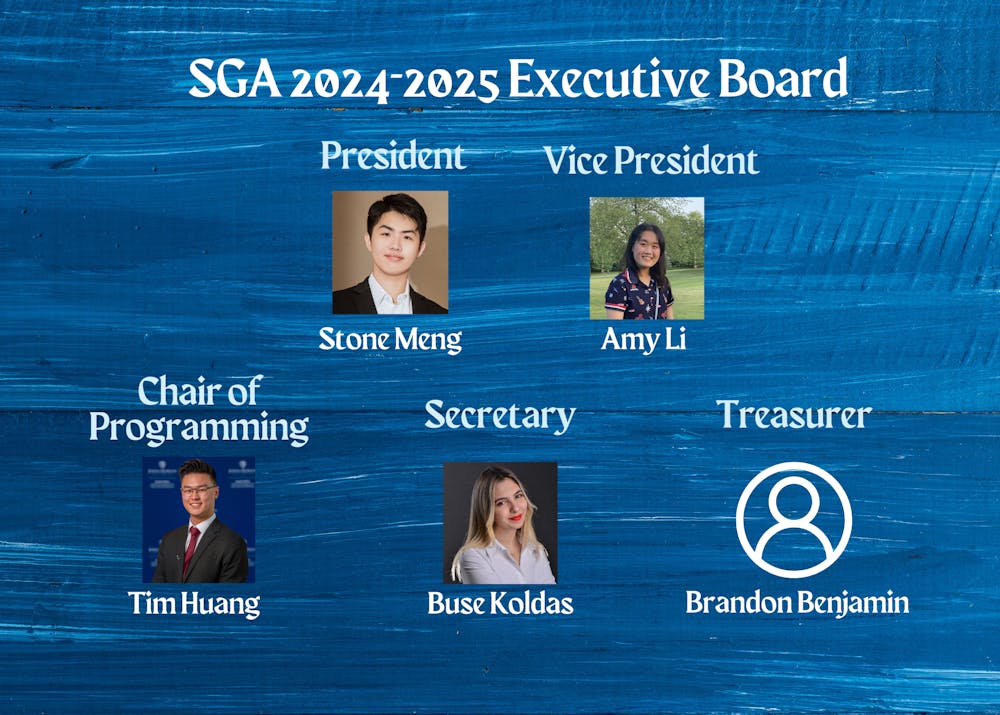The results for the 2024–2025 Student Government Association (SGA) Executive Board and class council elections were released on Wednesday, March 13. The Committee on Student Elections (CSE) reported that a total of 1,032 students voted, a number much lower than last year’s turnout of 1,453 students.
There were seven candidates for five executive board positions. The elected SGA Executive Board representatives are sophomore Stone Meng as president, sophomore Amy Li as vice president, freshman Buse Koldas as secretary, sophomore Tim Huang as chair of programming and junior Brandon Benjamin as treasurer.
Meng won executive presidency with 739 votes (76%), followed by Tyler Turner with 237 votes (24%). The vice presidential race was closer, as Li won with 615 votes (63%), followed by Nasreen Naqvi with 358 votes (37%). The three other positions were uncontested this year.
Li expressed enthusiasm for the upcoming school year in an email to The News-Letter.
“Given the expansion of SGA over the past year, we can align our visions more closely to make a greater impact on the student body. The executive branch candidates all have diverse experiences as SGA members, which strengthens our team,” she wrote.
Next year’s senior class president will be Angela Xiong, who will take over from Jennifer Tang Cabrera as the current senior class senator. The elected junior class president is Oluwakemi Abiodun, and the junior class senators will be Shruti Tyagi, Srigouri Oruganty, Avishi Garg and Anisha Rasamsetty. The elected sophomore class president is Vishnu Dontu, and the sophomore class senators will be Arihant Singh, Omotara Tiamiyu, Tarini Basireddy and Jazzlyn Fernandez.
In addition, the Hopkins Student Organization for Programming election occurred on the same ballot as the SGA election. The president position was uncontested, and junior Shreya Joshi was elected with 791 votes. Junior Angala Rajasegaran was elected as vice president with 575 votes, followed by sophomore Andrea Wat with 265 votes.
Last year, CSE used a hybrid voting system that allowed students to vote at four in-person polling booths or on an online form. The in-person booths were completely removed this year, so all votes were collected through an online form on CampusGroups. Except for this, the elections had minimal changes from the prior year.
As Meng, Li, Huang and Benjamin were on a ticket, they have common overarching objectives which prioritize making tangible changes. These include expanding free academic resources, streamlining funding for registered student organizations, minimizing shuttle delays and reducing tuition with the reconstruction of the Milton S. Eisenhower Library.
In an email to The News-Letter, Meng noted that there has been progress on some of these proposed campaign promises already.
“Every student deserves to see tangible results from their elected representatives, and I am committed to delivering on this promise. In fact, we are already working on many of these initiatives, such as making more academic resources free of charge,” he wrote.
Koldas outlined some of her goals as the elected executive secretary in an email to The News-Letter.
“As the Executive Secretary, I look forward to improving the SGA infrastructure, visibility, and communication channels, ensuring that SGA is more productive than ever,” she wrote.
All positions on the senate except for the Fraternity and Sorority Life and Religious and Spiritual Life senators were uncontested. Though elections are over, there remains a plethora of vacancies on the senate and programming councils.
Meng voiced that although the candidate pool was smaller than in previous years, it provided an opportunity rather than a setback.
“With fewer positions contested, we have the chance to concentrate our efforts on maximizing the efficiency and effectiveness of existing roles within the SGA,” he wrote. “By focusing on optimization rather than expansion, we can ensure that each position within the SGA is utilized to its fullest potential, driving meaningful change for our student body.”
However, he acknowledged that it is crucial to maintain diversity in SGA. The Executive Board plans to collaborate with CSE to organize special elections to fill the necessary vacant positions promptly and ensure equitable representation.
In an email to The News-Letter, Huang shared his hopes to increase student engagement with the student government.
“I really want to hear feedback from the students this year, and that will be one of our executive branch's main goals — increasing SGA outreach. We hope that this translates to real, tangible changes driven by the students,” he wrote.





